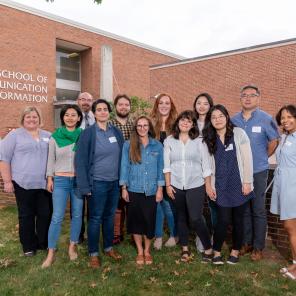April 14, Ph.D. Colloquia

Please join us for a research talk by Dr. Kurt Braddock from American University titled "Social Media and Psychology in the Ascension of the Far-Right: The Digital roots of the Capitol Attack and Beyond." This should be a fascinating and timely topic! The abstract for the talk is below, along with Zoom info for the call.
Social Media and Psychology in the Ascension of the Far-Right: The Digital Roots of the Capitol Attack and Beyond
On January 6, 2021, members of multiple far-right extremist groups stormed the U.S. Capitol. These groups were motivated by several factors, most of which have their origins in the online sphere. One of the most prominent factors contributing to the Capitol attack was the proliferation of disinformation on social media platforms, including Facebook, Twitter, Parler, Gab, and others. Although the January 6 attack is the most well-known result of far-right disinformation proliferation and spread, it is by no means the only outcome. Increased recruitment and radicalization into far-right groups is facilitated, in large part, by continued disinformation spread. This talk will focus on the role of social media in the promotion of far-right disinformation and its implications. More specifically, the talk will focus on the psychological effects of disinformation, including a discussion of violent radicalization. The talk will also feature a discussion of solutions for challenging disinformation, including counter-messaging and de-platforming, as well as the implications of both.
Please join us for a research talk by Dr. Kurt Braddock from American University titled "Social Media and Psychology in the Ascension of the Far-Right: The Digital roots of the Capitol Attack and Beyond." This should be a fascinating and timely topic! The abstract for the talk is below, along with Zoom info for the call.
Social Media and Psychology in the Ascension of the Far-Right: The Digital Roots of the Capitol Attack and Beyond
On January 6, 2021, members of multiple far-right extremist groups stormed the U.S. Capitol. These groups were motivated by several factors, most of which have their origins in the online sphere. One of the most prominent factors contributing to the Capitol attack was the proliferation of disinformation on social media platforms, including Facebook, Twitter, Parler, Gab, and others. Although the January 6 attack is the most well-known result of far-right disinformation proliferation and spread, it is by no means the only outcome. Increased recruitment and radicalization into far-right groups is facilitated, in large part, by continued disinformation spread. This talk will focus on the role of social media in the promotion of far-right disinformation and its implications. More specifically, the talk will focus on the psychological effects of disinformation, including a discussion of violent radicalization. The talk will also feature a discussion of solutions for challenging disinformation, including counter-messaging and de-platforming, as well as the implications of both.
